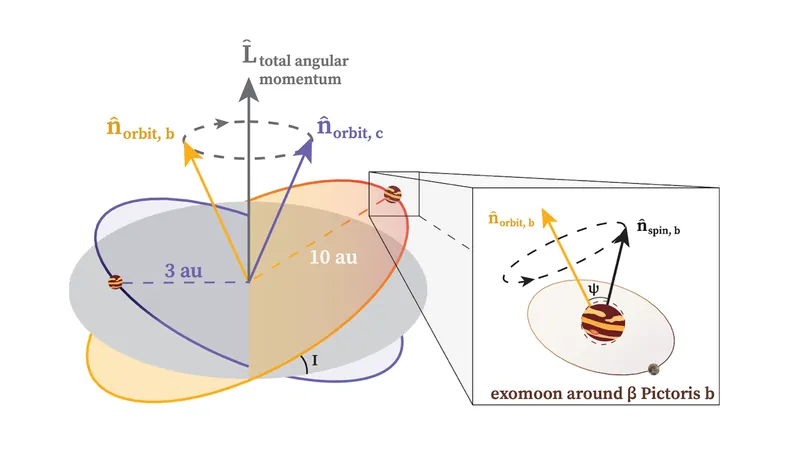
Dwayne Miller Honored with Prestigious Earle K. Plyler Prize for Groundbreaking Research in Molecular Spectroscopy
2024-12-16
Author: Sophie
Dwayne Miller Honored with Prestigious Earle K. Plyler Prize for Groundbreaking Research in Molecular Spectroscopy
Celebrated University Professor Dwayne Miller, from the Department of Chemistry, has been awarded the prestigious 2025 Earle K. Plyler Prize for Molecular Spectroscopy & Dynamics. This esteemed accolade acknowledges Miller's exceptional contributions in capturing an atomic perspective of molecular reaction dynamics, whether through experimental or theoretical breakthroughs.
Miller’s transformative research began in earnest in 2003, when he utilized innovative "ultrabright" electron sources to visualize the atomic motions occurring during structural transitions. His pioneering methods enabled him to record the first atomically resolved molecular reaction in 2013, significantly advancing the field. The realization of what Miller dubbed the "Atomic Movie" was once considered an unattainable goal due to the daunting challenges involved in achieving both femtosecond time resolution and atomic spatial resolution.
"The evolution of microscopy illustrates that with increased resolution, we can uncover deeper truths about the phenomena we study," Miller remarked. "Similar to Antonie van Leeuwenhoek's discovery of microscopic life forms, our work opens the door to new scientific theories."
Miller’s team ingeniously engineered ultrabright electron sources that can illuminate atomic motions and track them through a process known as diffraction. This technique directly correlates scattered electrons to atomic positions, functioning within a unique type of microscope where Fourier transforms act as lenses.
The implications of Miller's research are vast and profound. He elucidates that by directly observing atomic movements during key chemical moments, we gain essential insights into the nature of chemistry. “The number of possible atomic rearrangements in even small molecules is astronomical, raising fundamental questions about how chemical complexity scales up to biological systems.
One of the most revolutionary applications of Miller’s research lies within the realm of surgery. The insights gained from atomic visualization of laser-driven phase transitions have inspired the development of the groundbreaking Picosecond InfraRed Laser (PIRL) scalpel. This advanced device operates through laser ablation that confines energy to single-cell dimensions, avoiding collateral damage and minimizing the formation of scar tissue – a major advancement over traditional surgical techniques. Clinical trials for PIRL are set to begin in 2025, marking yet another milestone in cutting-edge medical technology.
Miller elaborated, "Our findings redefine the conditions for achieving rapid phase changes without concerning bubble growth and shock waves, which have historically led to significant tissue damage." He emphasized the significant progress made in site-selective drug delivery, positing that this could allow for drastically reduced dosages in cancer treatments, thereby limiting adverse chemotherapy effects.
Beyond his significant scientific accomplishments, Miller is also dedicated to fostering a passion for science among younger generations. He founded Science Rendezvous, a nationwide event in Canada that draws tens of thousands of participants yearly and encourages public engagement with science.
Miller’s journey to this momentous achievement has been a collective endeavor spanning over fourteen years, including a defining move in 1995 to the University of Toronto, which galvanized his team’s focus on the monumental task of capturing atomic movies. "The heart of this accomplishment belongs to my students, whose perseverance and creativity helped pave the way, even during our challenging early years," Miller expressed.
Amid these celebrations, Miller remains passionate about his work. "Directly observing the essence of chemistry allows us to appreciate its beauty and complexity,” he stated. "Understanding how the intricate details of chemistry converge into simpler reaction modes is foundational to unraveling one of the most profound questions of all: What is Life?"
Dwayne Miller’s groundbreaking contributions and future-oriented research promise to reshape our understanding of both chemistry and biology. This recognition is not merely a culmination of his work but also a stepping stone toward a future where the mysteries of life may be more fully understood.









 Brasil (PT)
Brasil (PT)
 Canada (EN)
Canada (EN)
 Chile (ES)
Chile (ES)
 España (ES)
España (ES)
 France (FR)
France (FR)
 Hong Kong (EN)
Hong Kong (EN)
 Italia (IT)
Italia (IT)
 日本 (JA)
日本 (JA)
 Magyarország (HU)
Magyarország (HU)
 Norge (NO)
Norge (NO)
 Polska (PL)
Polska (PL)
 Schweiz (DE)
Schweiz (DE)
 Singapore (EN)
Singapore (EN)
 Sverige (SV)
Sverige (SV)
 Suomi (FI)
Suomi (FI)
 Türkiye (TR)
Türkiye (TR)